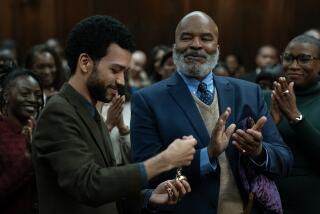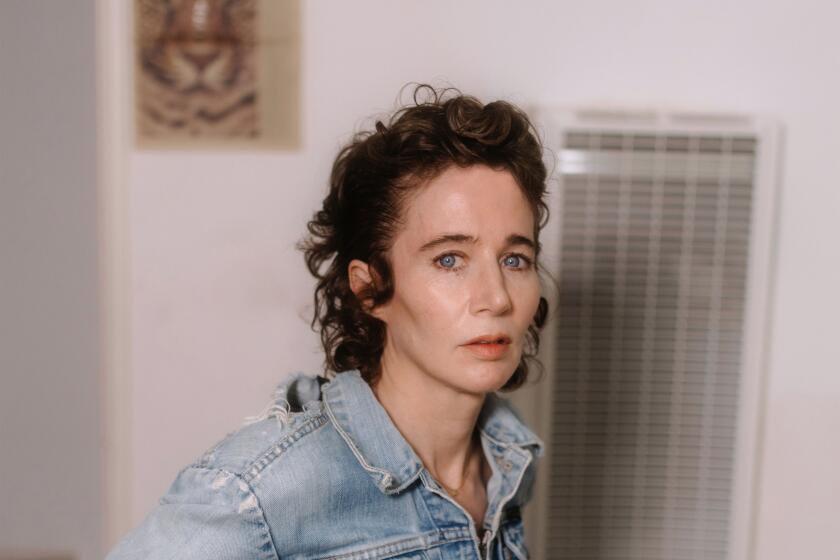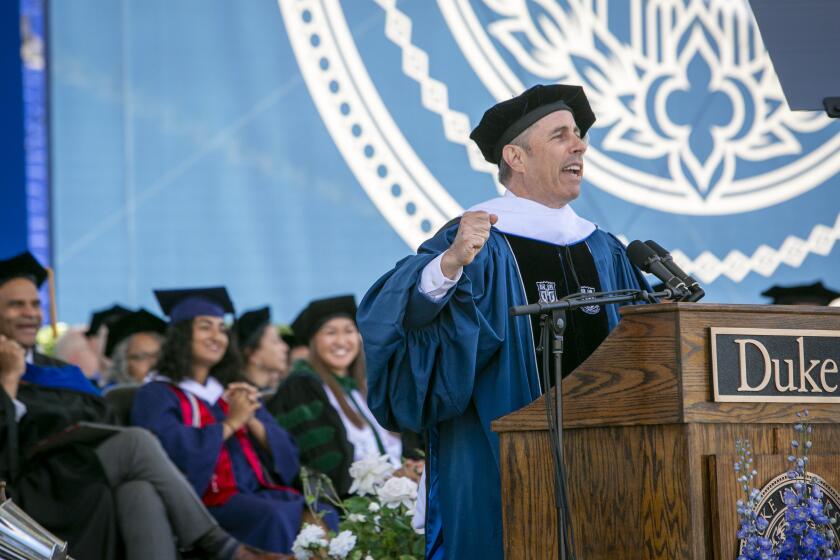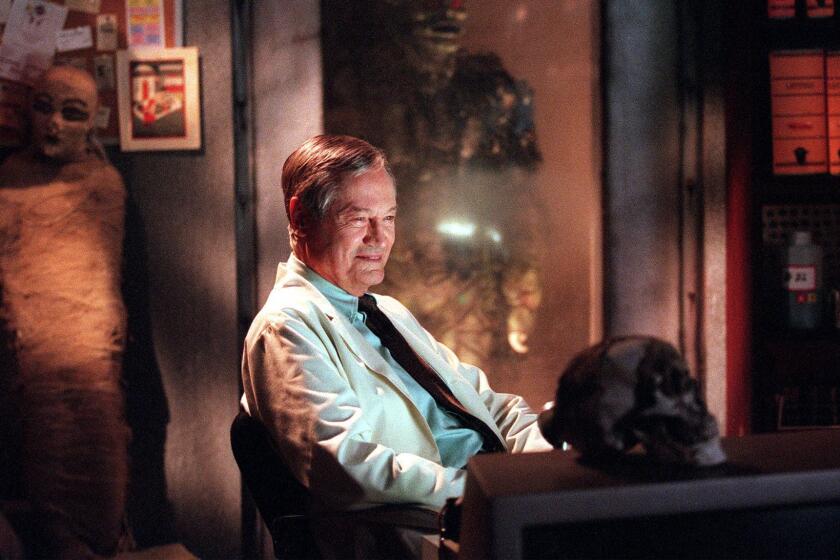Spoils From a Lost Battle Led to Ladd’s Biggest Victory
There’s nothing like the little gold bald guy to put things in perspective. Just ask Alan Ladd Jr.
Widely considered one of Hollywood’s favorite sons, the namesake of ‘40s and ‘50s screen idol Alan Ladd and a producer of “Braveheart” walked away Monday night with more than just a best picture Oscar. He walked away with peace of mind. The honor settled many scores.
“I never saw this one coming,” an elated Ladd, 58, said this week as congratulatory phone calls rolled in nonstop. Just a week before, he said, he had privately polled many of his colleagues in the academy who told him they hadn’t even seen the kilt epic, which opened May 24. He was sure “Apollo 13” would win.
Although Ladd, as a studio executive and producer, has had a hand in a whopping 14 best picture nominees, this was his first Oscar.
But his place in Hollywood history was already well established even without a trophy. Starting out as an agent--he once guided the career of Judy Garland--Ladd went on to serve as studio chief or head of production at three studios. He was the 20th Century Fox executive who green-lighted production of George Lucas’ “Star Wars,” which forever changed the movies.
He also played a key role in a host of other award-winning productions: “Chariots of Fire,” “Turning Point,” “Julia,” “Moonstruck,” “A Fish Called Wanda,” “Norma Rae,” “All That Jazz,” “Breaking Away,” “The Omen,” “Once Upon a Time in America” and “Nine to Five.” Of course, he’s had his share of turkeys, too.
It was a brief 1991 stint at MGM/UA (where he had been chairman and chief executive from 1985 to 1988) that caused the famously shy, soft-spoken Ladd great pain and embarrassment--but led to his arrival at Paramount toting a future best picture winner.
He had been hired at MGM by Italian financier Giancarlo Parretti, who was soon booted by the studio’s lender and eventual owner, the French bank Credit Lyonnais. The bank dumped Ladd not long after it ousted Parretti.
The MGM/UA production slate during his second tour of duty was largely an embarrassment. Only one picture--”Thelma & Louise,” which starred another Monday night winner, Susan Sarandon--achieved even modest box-office success.
*
The fiercely loyal MGM chief, who drew upon longtime relationships to attract major talent to the troubled studio, felt hamstrung by the battle between Parretti and the bank.
He has maintained that Credit Lyonnais handicapped him by not giving him enough cash to lure the best scripts and by refusing to lift the studio’s debt, which was strangling the production budget. The bank later forgave the debt for his replacement, Frank Mancuso.
In the end, Ladd landed at Paramount as an independent producer, cushioned with a $10-million exit bonus and two projects of his choosing from those he had green-lighted at MGM.
He picked “Bounty Hunter,” which was set to star Geena Davis but landed in turnaround and, eventually, back at MGM. The other was “Braveheart.”
“Laddie got the last laugh,” said Richard Zanuck, his closest friend and an Oscar-winning producer for “Driving Miss Daisy.” “This was a great vindication. And I, like a lot of other people in this town who love him, were absolutely thrilled to see him win.
“I was there with him at MGM in the Parretti days. . . . I saw his frustration. I saw the bank forgive that $400-million loan when Mancuso walked in so Mancuso wouldn’t have to pay huge interest payments on that debt. I saw that bank tell Laddie to live with it before. Good for Laddie.”
Without gloating, Ladd conceded: “I guess it is kind of a sweet justice. If I was more eloquent I would have thanked Credit Lyonnais [Monday night] for treating me shabbily [as studio chief] and allowing me to take this project with me. In fairness, MGM couldn’t have afforded to make this film at the time. Paramount could. But I’m glad that Frank is getting to make movies like ‘Birdcage.’ Who wouldn’t want to see an MGM comeback?”
(Mancuso declined to be interviewed for this story.)
Paramount studio chief Sherry Lansing, who brought Ladd to Paramount after his MGM ouster, said of his “Rocky” moment: “From my point of view, Laddie didn’t need a comeback. He’s always been a uniquely gifted talent with incredible taste.”
But Monday night was also a personal triumph--a win, in a sense, for his father, who died in 1964, never an Oscar winner.
Ladd said Paramount had slighted his father by not supporting him for a best actor nomination for 1953’s “Shane,” his last film under contract there. The film was generally regarded as the actor’s best performance. That support went to “Stalag 17” star William Holden, who took home the Academy Award.
*
Ladd had grown up on the Paramount lot. Despite his sad and distant relationship with his father, Ladd would while away his vacation days playing on the different backlot stages while the screen star was working. “I can remember my dad bringing me there in the morning and [me] saying, ‘Goodbye, Dad. I’ll see you at 6.’ That’s just the way it was.”
His parents were divorced when he was 2 and his father had little time for him. When the elder Ladd remarried, he started a second family and his namesake became little more than an afterthought--so much so that his face was often snipped out of publicity photos with his stepfamily.
As a child, he escaped loneliness by going to the movies, sometimes spending whole days watching films back to back. Today, his friends joke that he’s a walking film encyclopedia, knowing the most obscure pictures and bit players. His father’s famous friends--among them Bob Hope, Bing Crosby and Gary Cooper--were also regulars around the house.
Still, “I never wanted to be an actor. Their life was like living in a prison. Back then you didn’t have TV stars, so film stars were even bigger. They couldn’t go anywhere,” said Ladd, whose early goal was to be a film editor.
“I’ve been lucky. One of the things I was always proud of was that my dad was such a big star and the world loved him,” he said. “I never thought I could fill his shoes.”
So when Ladd stepped to the lectern Monday night, his brief address came as no surprise to those who know him: “I’d like to thank my family. Thank you.”
“I never heard Laddie say so many words in my life,” joked Richard Donner, who got his start as a director from Ladd. “Really, I wanted to choke him. Ninety-seven percent of the people in that audience know Laddie and they love him. I think a lot of us wanted him to stand up there for a moment longer and let us applaud him for finally getting something he deserves. There are snakes in this business and then there’s Alan Ladd Jr.”
More to Read
Only good movies
Get the Indie Focus newsletter, Mark Olsen's weekly guide to the world of cinema.
You may occasionally receive promotional content from the Los Angeles Times.






